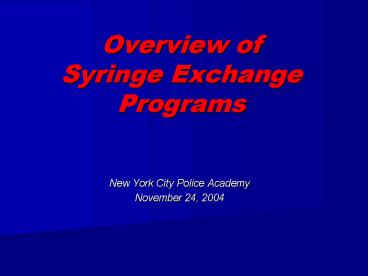Overview of Syringe Exchange Programs - PowerPoint PPT Presentation
1 / 20
Title:
Overview of Syringe Exchange Programs
Description:
... be effected if the only charge is criminal possession of a ... Without an ID card they should not be arrested and should not have syringes confiscated. ... – PowerPoint PPT presentation
Number of Views:475
Avg rating:3.0/5.0
Title: Overview of Syringe Exchange Programs
1
Overview of Syringe ExchangePrograms
- New York City Police Academy
- November 24, 2004
2
History of Syringe Exchange
- Title 10 N.Y.C.R.R. 80.131 (a) (2), 80.135.
- Enacted in 1992 in response to the HIV/AIDS
epidemic. - Gives the NYS Commissioner of Health the
authority to grant waivers to health facilities,
community based organizations and hospitals to
collect and distribute syringes.
3
Syringe Exchange (SEP) in New York State
- 13 Programs
- 9 in New York City
- 1 in Buffalo (Eric County)
- 1 in Rochester (Monroe County)
- 1 in Mount Vernon (Westchester County)
- 1 in Ithaca (Tomkins County)
4
Integrated Services
- Outreach Services
- Client Intake/Triage
- Syringe Exchange
- Drop-in Center
- Medical Care/Dental
- Prevention Case Management
- Prevention with Positives
- Group and Individual Level Interventions
- Mental Health Services
5
Monitoring and Evaluation
- NYSDOH/AIDS Institute has oversight
responsibilities for syringe exchange programs. - Comprehensive application process.
- Stringent data collection requirements.
- AIDS Institute provides technical assistance,
site visits, annual audit and program evaluation.
6
NYPD Operations Order
- Possession of sterile and used syringes is legal.
- There is no limit on the number of syringes one
can carry. - There is no limit of the geographical location in
New York State or City injectors can possess
syringes in areas where there is no exchange
program.
7
NYPD Operations Order
- An arrest should not be effected if the only
charge is criminal possession of a hypodermic
instrument. - An arrest should not be effected for residue in a
used syringe. - Syringes should never be confiscated and if
arrested syringes can be documented as personal
property and returned after release.
8
NYPD Operations Order
- Programs are anonymous and confidential.
- Participants are issued ID cards which contain
codes. - Program ID codes are different and all utilize
variations of numbers and letters. - All program ID cards have a 24 hour verification
phone number listed on the back of the card.
9
NYPD Operations Order
- Individuals over 18 can buy up to 10 syringes in
a pharmacy not everyone has a program ID card
to possess syringes. - Without an ID card they should not be arrested
and should not have syringes confiscated. - Officers should not confiscate program cards or
syringes at any time.
10
Adolescent Drug Injectors
- Adolescent drug injectors have poor access to
sterile syringes because they do not have
identification or proof of age to buy syringes in
a pharmacy. - Without ID syringes may be confiscated leading to
sharing or buying used syringes.
11
Adolescent Drug Injectors
- Adolescents are very vulnerable on the street and
often have to act tough to get by. - Adults want to take away adolescents syringes or
force them to stop using this often leads to
more harmful behaviors of sharing syringes.
12
Outcomes and Success HIV Seroprevalence among
IDUs in NYDon C Des Jarlais Beth Israel Medical
Center, New York, NY
13
Outcomes and Success
- There has been an 80 reduction in HIV
transmission. - NYC 19902 50 of IDUs were HIV positive, 4
infected per year - NYC 2002 as few as 18 of IDUs are HIV positive,
1 infected per year
14
Outcomes and Success Received HIV Testing at NYC
Needle ExchangesDon C Des Jarlais Beth Israel
Medical Center, New York, NY
15
Public and Personal SafetyResearch About
Syringe Exchange Shows Don C Des Jarlais Beth
Israel Medical Center, New York, NY
- Syringe exchange reduces HIV and hepatitis C
transmission without increasing drug use. - Programs provide immediate access to drug
treatment, medical care and mental health
services.
16
Public and Personal SafetyResearch About
Syringe Exchange Shows Don C Des Jarlais Beth
Israel Medical Center, New York, NY
- No negative impact on crime.
- Fewer discarded syringes 82 return rate
- Reduction in needlestick injuries to law
enforcement.
17
Public and Personal SafetyResearch About
Syringe Exchange Shows Don C Des Jarlais Beth
Israel Medical Center, New York, NY
- No effect on increase of drug use in the
community. - No increase in the number of new injectors.
Participants average 15 - 20 year injection
history. - Less than 1 of participants are under 20 yrs
old.
18
Resource for the Police
- Have provided disposal of syringes found in the
community programs respond to any calls to clean
up/dispose infected syringes - Program staff will come to precincts to provide
roll call presentations, sharps containers,
needlestick, and syringe disposal information
19
Resource for the Police
- Syringe exchange programs teach IDUs how to
inform officers they are in possession of
syringes prior to being searched. - Programs request that participants respect
officers and document badge number and precinct
if syringes are confiscated. - Police can refer drug users to our services for
medical care and drug treatment.
20
(No Transcript)































